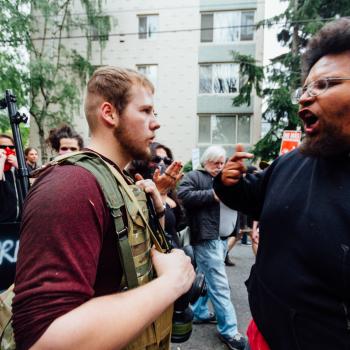First, you must ask yourself, did Jesus sin?
Forget about all the revolts and uprisings of the Hebrew Bible. Forget about the liberation of an oppressed people, again and again, through violent means by God’s own hand. Forget about Paul in prison or Peter on the cross. Forget about the scandal and the risk each and every apostle took each and every time they spoke or acted in service to the Gospel.
Forget everything else, and just focus on Jesus the Christ.
If you believe, as I do, that Jesus Christ was both fully god and fully man, and that his life is the perfect example all Christians should aspire to, then there are some corollaries you are just going to have to accept.
- Christ protested
- Christ threatened violence
- Christ damaged property
- Christ disrupted commerce
Do not think that I have come to bring peace to the earth; I have not come to bring peace, but a sword.
-Mt 10:34, NRSV
I have written before about Jesus and violence. I have pointed readers toward his teachings. But today, while Minneapolis is burning and so many other cities are ready to erupt, might be a good time to revisit the theology of riot.
First, you have to understand that any real analysis of Christ has to take into account that he came to Earth as a first-century Jew. He was born into poverty, not privilege. He was a part of a people who had escaped from slavery, only to find generation after generation of continued oppression. He was born under Roman rule, and was a racial minority in the empire. From the moment of his birth, he was hunted by authorities, and thousands of his generation were murdered by a police state.
Is any of this starting to sound familiar?
Christ knew he was going to die. He discussed this with his disciples beforehand four times in Matthew, three times in Mark, three times in Luke, and once in John. He knew that his death would be at the hands of elders, priests and scribes, the local authorities of his time. He knew his own actions would trigger these events. And he took those actions anyway.
Every Palm Sunday, Christians around the world celebrate one of Jesus’ most famous protests, his entry into Jerusalem (Mt. 21:1-9), and then we promptly forget its purpose. Jesus’ entry into Jerusalem on a symbolic donkey during Passover was an act of protest, designed to put Pilate’s corrupt government on notice that the Christ was coming for them. And Jesus didn’t stop there. He armed his apostles, knowing that this act would cause him to be seen as a dangerous criminal (Lk. 22:36-37). He vandalized property and disrupted commerce (Jn. 2:13-16).
What was the result of all this? Jesus Christ made the corrupt authorities afraid (Mk. 11:18). And they struck back, hard.
Obviously, this column is not legal advice. It is worth remembering that Jesus was arrested, convicted and executed by the same government he protested. But Jesus’ protests worked, and we would not have his teachings today if he had not brought attention to them in this way. It is also worth remembering that all of Christ’s violence was toward property, not people, and he specifically instructed his followers accordingly (Mt. 26:52-54).
The simple fact is, Jesus protested. And Jesus won.
Remembering the great civil rights struggles of our day, we have to at least contemplate the methodology of great leaders like MLK and Gandhi. But remember that the threat of violence was always underlying. There was no MLK without Malcolm. There was no Gandhi without the threat of revolution.
I do not advocate burning buildings or smashing windows, because the risk to human life is always imminent. I do not advocate looting, because it is participating in the materialism Christ spent his life advocating against.
But the disruption of commerce and the fear that always comes when corrupt authorities see a mass of righteously angry humans moving toward them—these are the mechanisms by which every successful liberation happens.
So disrupt. Protest. March in the streets. Stop traffic. Stop commerce. Get the police on video. You do not have to worry about whether these actions are right or wrong, only about whether they are effective in bringing about the Kingdom of God on Earth.
As the old saying goes, “first they ignore you, then they laugh at you, then they fight you, then you win.”













